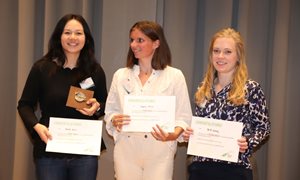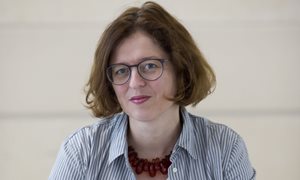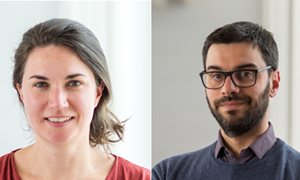14 February 2019
Previously, Nicoline Hoogerbrugge, theme Tumors of the digestive tract, and colleagues showed that mutations in the NTHL1 gene lead to intestinal polyps that may develop into colorectal cancer. However, they observed that patients with mutations in this gene often have other types of cancer as well. In their publication, the researchers describe 17 families in which members of a single generation had mutations in the NTHL1 gene. Half of these patients developed various types of cancer during their lives, with breast cancer being particularly common.
Mutations in the NTHL1 gene are very rare. A mutation in the NTHL1 gene only leads to cancer when the mutation is inherited from both parents. The researchers estimate that this is the case in about 1 in 115,000 people. The syndrome is difficult to detect because it only leads to cancer in a single generation of a family. Hoogerbrugge: “Currently, we already test patients with many intestinal polyps for mutations in the NTHL1 gene, but now we know that we should do this for more patients. Over the long term we want to screen for mutations in the NTHL1 gene in patients diagnosed with multiple cancers, as well as in patients that have brothers or sisters with multiple cancers.”
Improved characterization of patients with mutations in the NTHL1 gene may lead to better assessment of their lifetime risk to develop certain types of cancer. “It is important for patients to be aware of their risk for breast cancer and also for me as a physician, so I can make recommendations,” says Maartje Nielsen, clinical geneticist at the Leiden University Medical Center. She recommends that patients with mutations in the NTHL1 gene should be screened for various types of cancer, including colorectal cancer and breast cancer.
 Rare mutations in the NTHL1 gene, previously associated with colorectal cancer, also cause breast cancer and other types of cancer. Judith Grolleman (m), Nicoline Hoogerbrugge (l) and Richarda de Voer (r), theme Tumors of the Digestive tract, and researchers from Leiden University Medical Center and the Princess Máxima Center in the Netherlands report this new multi-tumor syndrome, in collaboration with international colleagues, in Cancer Cell.
Rare mutations in the NTHL1 gene, previously associated with colorectal cancer, also cause breast cancer and other types of cancer. Judith Grolleman (m), Nicoline Hoogerbrugge (l) and Richarda de Voer (r), theme Tumors of the Digestive tract, and researchers from Leiden University Medical Center and the Princess Máxima Center in the Netherlands report this new multi-tumor syndrome, in collaboration with international colleagues, in Cancer Cell.
Previously, Nicoline Hoogerbrugge, theme Tumors of the digestive tract, and colleagues showed that mutations in the NTHL1 gene lead to intestinal polyps that may develop into colorectal cancer. However, they observed that patients with mutations in this gene often have other types of cancer as well. In their publication, the researchers describe 17 families in which members of a single generation had mutations in the NTHL1 gene. Half of these patients developed various types of cancer during their lives, with breast cancer being particularly common.
Mutations in the NTHL1 gene are very rare. A mutation in the NTHL1 gene only leads to cancer when the mutation is inherited from both parents. The researchers estimate that this is the case in about 1 in 115,000 people. The syndrome is difficult to detect because it only leads to cancer in a single generation of a family. Hoogerbrugge: “Currently, we already test patients with many intestinal polyps for mutations in the NTHL1 gene, but now we know that we should do this for more patients. Over the long term we want to screen for mutations in the NTHL1 gene in patients diagnosed with multiple cancers, as well as in patients that have brothers or sisters with multiple cancers.”
Improved characterization of patients with mutations in the NTHL1 gene may lead to better assessment of their lifetime risk to develop certain types of cancer. “It is important for patients to be aware of their risk for breast cancer and also for me as a physician, so I can make recommendations,” says Maartje Nielsen, clinical geneticist at the Leiden University Medical Center. She recommends that patients with mutations in the NTHL1 gene should be screened for various types of cancer, including colorectal cancer and breast cancer.
Mutation pattern
The researchers used a new method to determine that NTHL1 mutations also cause breast cancer and other types of cancer. This method is based on the fact that mutations in the NTHL1 gene cause a specific pattern of mutations in the DNA of the tumor. Because this pattern only occurs in tumors of patients with an NTHL1 mutation, and not in tumors from other patients, the researchers were able to link this pattern to the disrupted NTHL1 gene. In the future, this method can be used to detect new genetic causes of cancer. Roland Kuiper, molecular geneticist at the Princess Máxima Center: “More than 30 such mutation patterns are already described, which are not only specific for NTHL1 defects. If all the tumors in a patient with multiple types of cancer have the same mutation pattern, this is a strong indication that there is a genetic cause. This means that all these tumors developed in the same way.” Richarda de Voer, molecular biologist at Radboud university medical center, adds: “It has become increasingly difficult to find new cancer genes. By searching for mutation patterns in patients, we are able to take the next step in determining the genetic cause in more cancer patients.”NTHL1
NTHL1 is involved in DNA repair. It recognizes a specific form of DNA damage. If a mutation occurs in the NTHL1 gene, there is no NTHL1 protein. Consequently, this specific form of DNA damage is not recognized and not repaired, leading to an accumulation of mutations, which causes cancer. Due to mutations in the NTHL1 gene, errors in the DNA where a ‘C’ is replaced by a ‘T’, are not corrected. These errors occur at specific locations in the DNA, resulting in a recognizable mutation pattern.Related news items

Renee Salz wins prize for best presentation
10 May 2022 Renee Salz won the award for best oral presentation during the Rolduc genetics retreat, organized by the Dutch and Belgian Societies of Human Genetics in Brugge. Her presentation was titled "Variant effect prediction based on long read transcriptomes". go to page
Pathology reporting of gastric endoscopic resections: Recommendations from the International Collaboration on Cancer Reporting
17 November 2021 Iris Nagtegaal, theme Tumours of the digestive tract, and colleagues published her research project in Gastroenterology about pathological reporting of gastric endoscopic resections. go to page
Chella van der Post and Francesco Ciompi received a grant from Hanarth Foundation
11 November 2021 Unmasking the invisible cancer: digital detection of diffuse-type gastric carcinomas. go to page
Awarded KWF grants for Radboudumc researchers
18 December 2019 KWF is investing 2.7 million euros in five different studies at Radboudumc. The awards are part of the new round of funding by DCS, in which over 34 million euros will be granted to Dutch cancer research. We congratulate our researchers with this funding and wish them success with their great work. go to page
Nicoline Hoogerbrugge and Michiel Vermeulen newly elected in Academia Europaea
26 July 2019 The Academia Europaea is a functioning European Academy of Humanities, Letters and Sciences, composed of individual members. go to page